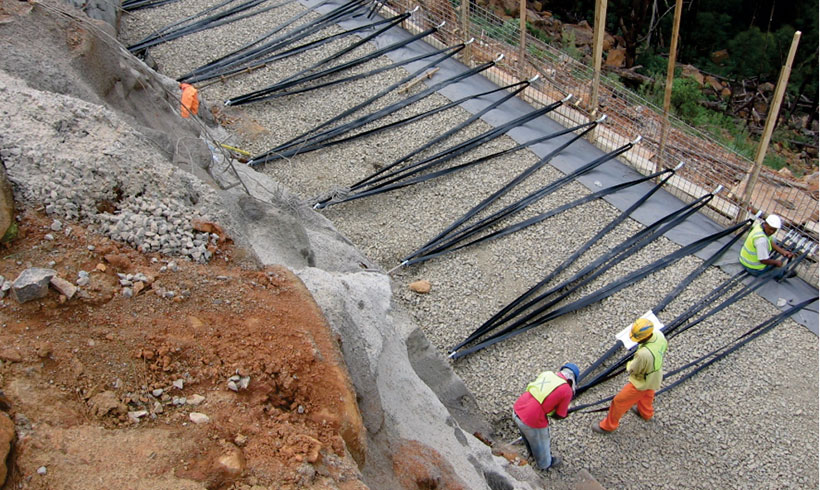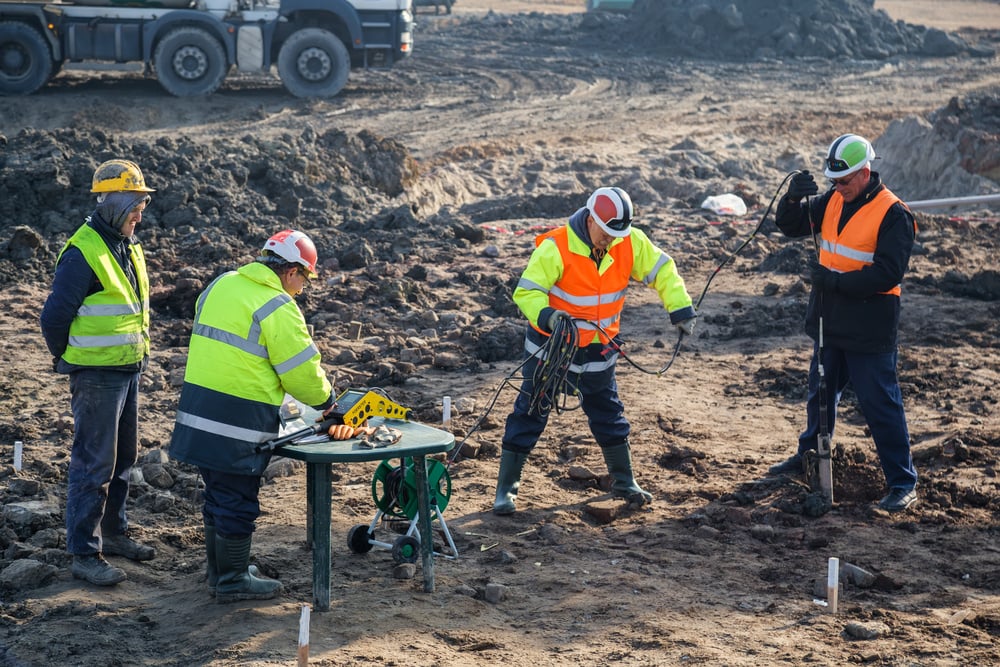The Main Principles Of Specialized Geotechnical Engineering Solutions
The Main Principles Of Specialized Geotechnical Engineering Solutions
Blog Article
The Buzz on Specialized Geotechnical Engineering Solutions
Table of ContentsGetting My Specialized Geotechnical Engineering Solutions To WorkThe Ultimate Guide To Specialized Geotechnical Engineering SolutionsWhat Does Specialized Geotechnical Engineering Solutions Do?The Single Strategy To Use For Specialized Geotechnical Engineering Solutions
They conduct site investigations, collect examples, execute research laboratory examinations, and analyze data to review the viability of the ground for construction jobs. Based on their searchings for, geotechnical designers supply suggestions for structure style, incline security, preserving frameworks, and mitigation of geotechnical threats. They team up with other specialists, such as engineers, architectural designers, and building groups, to ensure that geotechnical factors to consider are incorporated into the total project style and execution.
Structure Style: Geotechnical designers play an essential function in making structures that can securely sustain the intended structure. They examine the soil problems and lots needs to establish the proper structure type, such as shallow structures (e.g., grounds), deep structures (e.g., heaps), or specialized strategies like dirt renovation. They consider factors such as negotiation restrictions, birthing capability, and soil-structure communication to establish optimal foundation layouts.
Some Known Incorrect Statements About Specialized Geotechnical Engineering Solutions
Below are some sorts of geotechnical designers: Structure Designer: Foundation engineers concentrate on developing and examining foundations for structures - Specialized Geotechnical Engineering Solutions. They assess the dirt problems, load needs, and website qualities to determine the most appropriate foundation type and layout, such as superficial structures, deep foundations, or specialized strategies like heap structures
They execute area testing, gather samples, and analyze the collected data to define the soil residential or commercial properties, geologic developments, and groundwater problems at a site. Geotechnical Instrumentation Engineer: Geotechnical instrumentation designers focus on monitoring and gauging the actions of dirt, rock, and frameworks. They install and maintain instrumentation systems that check aspects such as dirt settlement, groundwater levels, slope movements, and architectural variations to examine performance and give early warnings of prospective problems.
In the office environment, geotechnical designers use specialized software tools to do calculations, create styles, and analyze data. Specialized Geotechnical Engineering Solutions. They prepare records, evaluation task specs, connect with clients and employee, and coordinate project tasks. The workplace setting gives a favorable environment for research, analysis, and partnership with various other professionals associated with the project
They often visit project sites to perform website examinations, analyze geotechnical problems, and collect information for analysis. These brows through entail traveling to different areas, sometimes in remote or difficult surfaces. Geotechnical designers might carry out dirt tasting, conduct tests, and display construction tasks to ensure that the geotechnical facets of the project are being applied correctly.
Unknown Facts About Specialized Geotechnical Engineering Solutions
Geotechnical designers additionally work in specialized geotechnical laboratories. Geotechnical research laboratory engineers work thoroughly in these environments, taking care of screening equipment, running instruments, and recording information.
Preserving Wall surfaces: Creating wall surfaces that hold back soil to stop landslides and give stability on sloped surfaces. Embankments and Earthworks: Designing embankments for roads, trains, and dams to guarantee they remain secure under anxiety. The mining sector relies greatly on geotechnical engineering to make certain the safety and longevity of its operations.
With this in mind, we have made our program to prepare pupils for success. The Geotechnical Engineering program at the College of Delaware offers possibilities for innovative research study and research study in: Soil and rock mechanics Soil-structure interaction Integral modeling Computational geomechanics Structure and earth structures engineering Ground enhancement Incline stability and landslide stabilization Liquefaction of soils and quake design Laboratory characterization of geomaterials and soil support Environmental geotechnics Given the strong need for improvement to our nation's infrastructurethe American Society of Civil Engineers gave the united state
Geotechnical engineering is a branch of civil engineering; however, it includes using scientific methods and principles to collect and translate the physical homes of the ground. Geotechnical designers are included in all stages of the style of frameworks, from principle to building and construction. Their job is important in the layout and preparation procedure as they assess the integrity of soil, clay, silt, sand, and rock, before building and construction commencing.
A Biased View of Specialized Geotechnical Engineering Solutions
This is followed by a ground examination based on the findings of the desk study and includes trial pitting and sampling to reveal any type of potential issues. Geotechnical engineers function within multidisciplinary groups, supported by intermediate and junior designers as well as by CAD professionals. As a senior geotechnical designer on a hydro plant task, tasks may include taking part in Discover More Here technical evaluations (e.g., peer reviews), tailings dam examinations, dam security evaluations, and other research studies associated with the style and building and construction of mine waste facilities.
While some professionals specialise entirely in geotechnics, others might function under titles like design geologist or ground designer within similar capacities. As a geotechnical designer, you'll require to: construct and preserve relationships with customers and other experts entailed in the site, throughout each projectmaintain safety criteria on site be mindful visit the site of expense effects when you make recommendationsstudy geological maps and airborne photos from a variety of resources and from different time periodsexamine building and construction plans to see just how possible they are based on your understanding of the siteinvestigate risks or geological risks for the sitesearch for environmentally delicate functions, such as garbage dump start to establish accurate and interpretive ground modelsplan area investigationsdrill and analyse examples of bedrock, soil, groundwater and additional materials supervise various other professionals on sitesolve technological concerns as they develop, such as unanticipated frameworks at drill sitesmonitor problems during and after construction to ensure frameworks are steady in the brief and long termadd data gathered on site to your initial researchcreate geotechnical calculations, illustrations, and 2 or three-dimensional computer models interpreting the datamake recommendations concerning the recommended usage of the website.
There are great deals of chances to satisfy brand-new people, as you'll work with an array of experts at every website. The work can be demanding as you might be accountable for the safety of others while on site. There is additionally a high degree of monetary duty, as the suggestions you make can have significant price effects.

Report this page